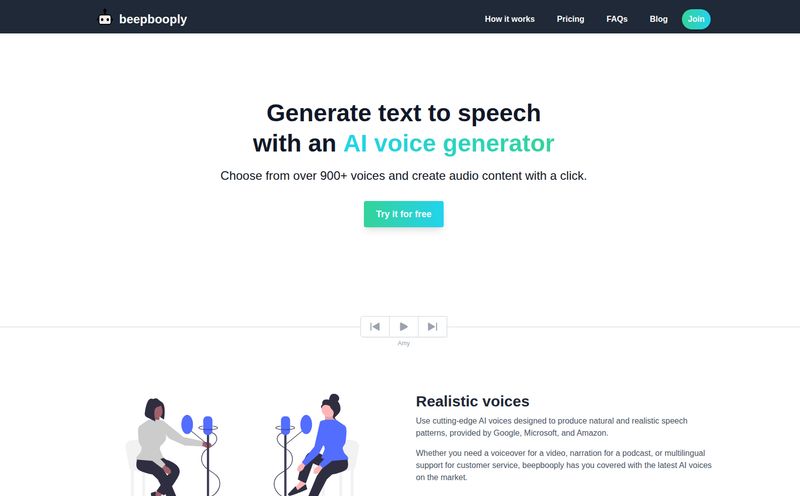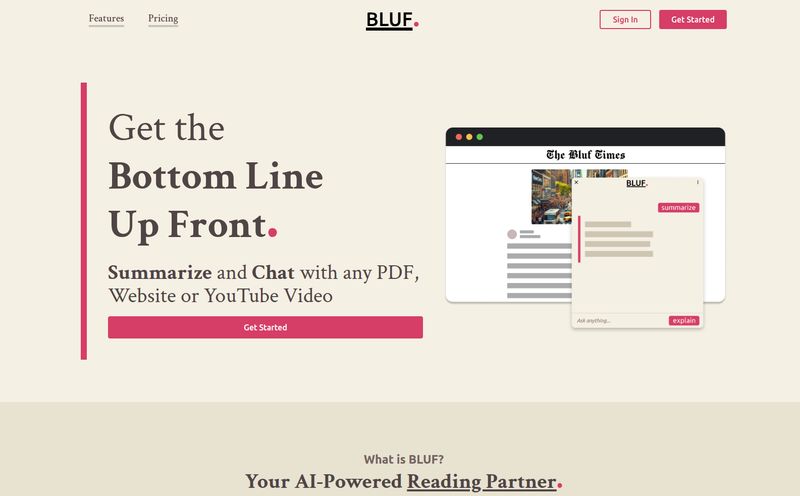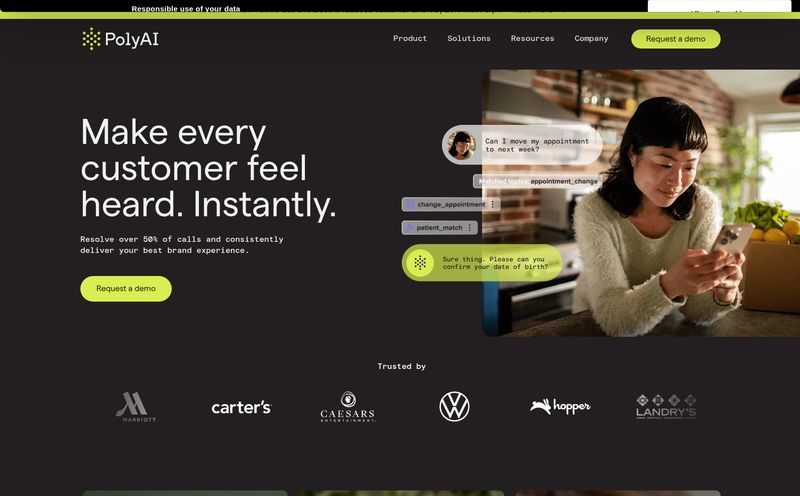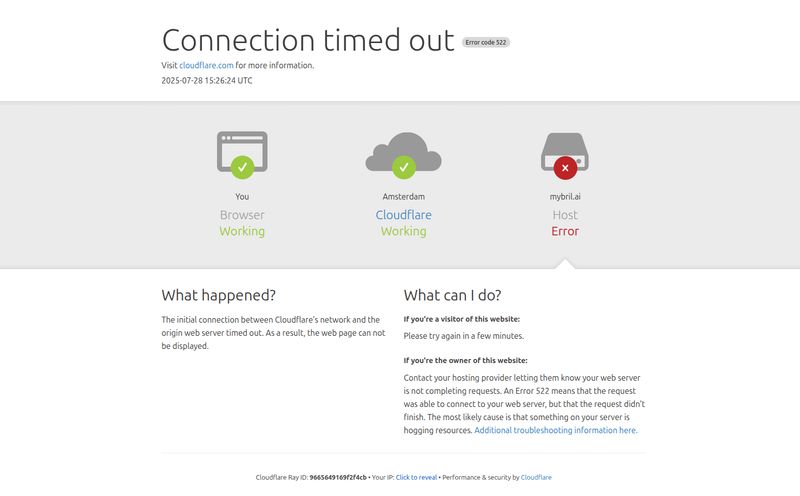You ever get that feeling? You stumble upon a tool or a service online that seems like it was designed specifically for you. It promises to solve that one nagging problem you’ve been wrestling with for ages. For me, as someone who's constantly drowning in a sea of articles, whitepapers, and research docs, the idea of turning them all into personal audiobooks I can listen to on my commute is… well, it’s the dream, isn't it?
So, when I first heard about a tool called Audibles, my ears perked up. Not the big Amazon one, but a plucky upstart with a similar name. The pitch was simple and beautiful: upload your documents, and it would use natural-sounding AI voices to create your own private audio library. It supported multiple languages and let you pick your narrator. I was already imagining myself absorbing industry reports while walking the dog. Glorious.
And then, just as quickly as I found it, I hit a brick wall. A digital dead end.
A Promising Service, Now a Digital Ghost Town
Instead of a slick sign-up page, anyone visiting the Audibles site today is met with a single, stark sentence: "This service has been suspended by its owner."

Visit Audibles
Oof. It’s like discovering an amazing-looking bakery that has a permanently-locked door and a “Closed Forever” sign in the window. All that potential, just… gone. It's a bummer, and honestly, a pretty common story in the fast-moving tech world. Tools and startups pop up and disappear like fireflies. But this one felt like a missed opportunity, because the idea behind it is more relevant than ever.
What Was Audibles Supposed to Be?
From the digital breadcrumbs left behind, we can piece together the vision. Audibles wasn't just another robotic text-reader. The goal was to create genuinely captivating audiobooks. That word choice is important. It suggests an ambition beyond simple utility.
The Dream of Your Personal Audiobook Factory
The core concept was to be your personal audiobook converter. Got a 50-page PDF from a client? A long-form article you’ve been meaning to read? An ebook in a clunky format? The promise was that Audibles could handle it, turning a task (reading) into a passive experience (listening). This is a game-changer for productivity junkies and multitaskers. For me, the ability to 'read' with my ears while my eyes are busy with something else is pure gold.
Voices That Sounded Human
Let's be real, many of us have been scarred by the monotone, soulless voice of early GPS systems or screen readers. It’s what I call the “robot uncanny valley.” It’s almost human, but just off enough to be grating. Audibles aimed to solve this by offering a selection of high-quality, natural-sounding AI voices. The tech in this space has gotten insanely good lately, moving from simple text-to-speech (TTS) to incorporating inflections and tones that mimic actual human speech. Audibles was riding that wave.
Speaking Your Language
The multi-language support was another huge plus. In our globalized world, being able to process and understand documents in different languages is a massive advantage. Converting a report in Spanish or a technical manual in German into listenable audio opens up a world of content that might otherwise be inaccessible or just a whole lot harder to get through.
So Why Did We Even Need a Tool Like This?
The disappearance of Audibles leaves a void because the problem it tried to solve is very real. The demand for audio content has exploded. Just look at the growth of podcasts and audiobooks. According to Grand View Research, the global audiobook market is booming, and that's just for commercially produced content.
We're all looking for ways to consume more information more efficiently.
- For professionals and marketers: It's about staying ahead. Imagine turning your competitor's latest blog posts into an audio digest for your morning commute.
- For students: It's a powerful study aid. Turning dense textbook chapters or research papers into audio files can be a huge help for learning and retention.
- For accessibility: This is a big one. For individuals with visual impairments or reading disabilities like dyslexia, tools that convert text to high-quality audio aren't just a convenience; they're a necessity.
Where to Go Now That Audibles Is Gone
Alright, so Audibles is off the table. Mourning period over. What can we use right now to get our text-to-audio fix? Thankfully, the market has some seriously impressive players. I’ve fiddled with a few, and here’s a quick rundown of some solid alternatives.
| Tool | What It's Great For | My Quick Take |
|---|---|---|
| Speechify | Personal use, students, reading articles and PDFs. | Probably the most popular one out there. Super slick browser extension and mobile app. You can even snap a picture of a physical book page and have it read to you. The premium voices (like Gwyneth Paltrow's) are a bit of a gimmick, but the standard AI voices are excellent. |
| Murf.ai | Content creators, marketers, podcasters. | This one is more of a professional voiceover studio. It's less about personal consumption and more about producing audio content. The level of control over pitch, pacing, and emotion is incredible. It’s what you use to turn a script into a podcast or video narration. |
| NaturalReader | A bit of everything, good free tier. | A solid, long-standing option that works well for documents, webpages, and emails. It has a pretty generous free version, which makes it a great starting point if you’re just dipping your toes into teh TTS water. |
There are tons of others, of course, from dedicated software to built-in features on our phones. The point is, the dream that Audibles represented is very much alive and kicking in other forms.
A Final Thought on a Tool That Could Have Been
The story of Audibles is a little bittersweet. It’s a reminder of a great idea that, for whatever reason—funding, technical hurdles, maybe even a legal letter from a certain e-commerce giant's legal team (total speculation on my part)—didn't make it. But it also highlights a real, growing need in our content-heavy world.
We want to learn and consume information on our own terms, and increasingly, that means listening. While Audibles itself may be a digital fossil, the path it was trying to forge is now a well-trodden highway. And with the alternatives available today, you can start building your own personal audiobook library right now. Your eyes will thank you for it.
Frequently Asked Questions
- What was the Audibles text-to-speech tool?
- Audibles was a platform designed to convert documents like PDFs, articles, and other text files into audiobooks using high-quality, natural-sounding AI voices. It supported multiple languages and voice choices.
- Is the Audibles tool still available?
- No, it is not. The service's website currently states, "This service has been suspended by its owner." There is no information on whether it will return.
- How much did Audibles cost?
- Because the service was suspended before it could gain widespread adoption, there is no public information available regarding its pricing or subscription plans.
- Why would I want to convert documents to audio?
- There are many reasons! It's great for multitasking (listening while you drive, cook, or exercise), for accessibility (assisting those with visual impairments or dyslexia), for studying, and for giving your eyes a break from screens.
- What are some good alternatives to Audibles in 2024?
- There are several excellent alternatives. Speechify is fantastic for personal use and reading web articles. Murf.ai is a professional-grade tool for creating voiceovers. NaturalReader is another strong contender with a good free option.
- Is AI-generated audio good enough to listen to for long periods?
- Absolutely. While older TTS technology was robotic, modern AI voices from top platforms are incredibly realistic. They include natural inflections, pauses, and tone, making them very easy and pleasant to listen to for extended periods.



